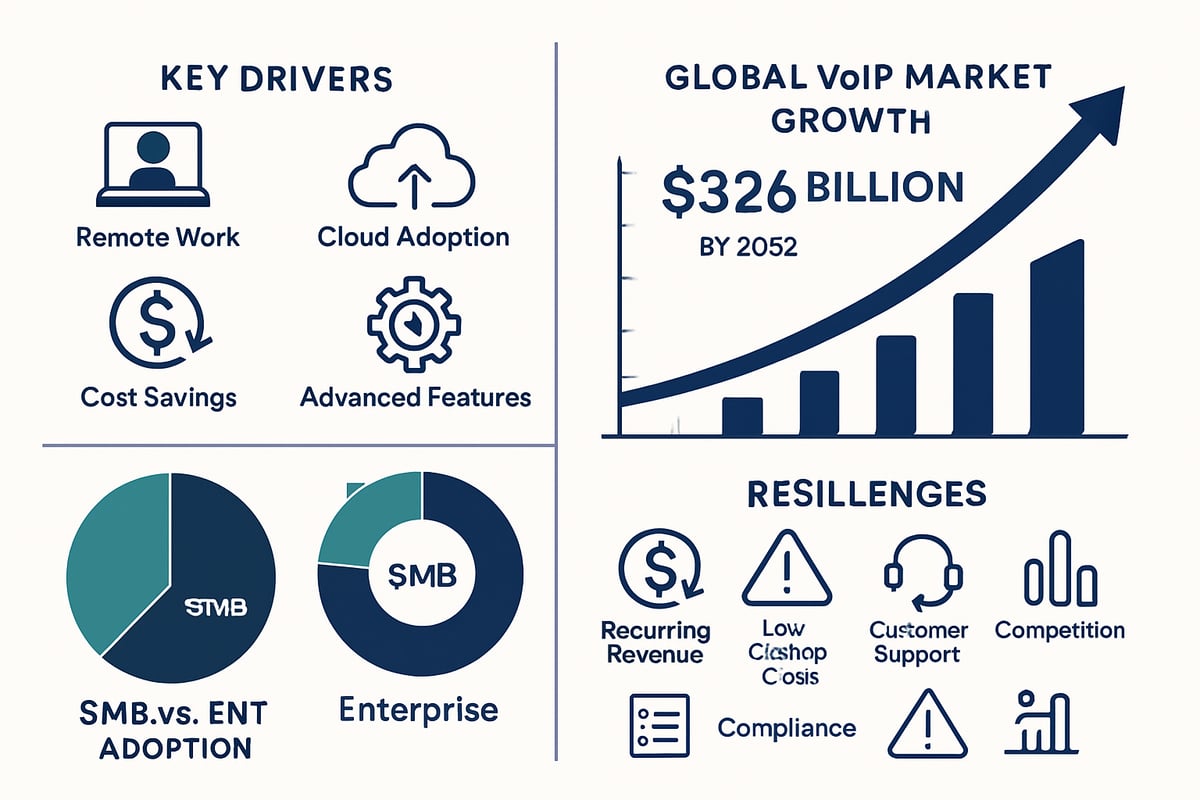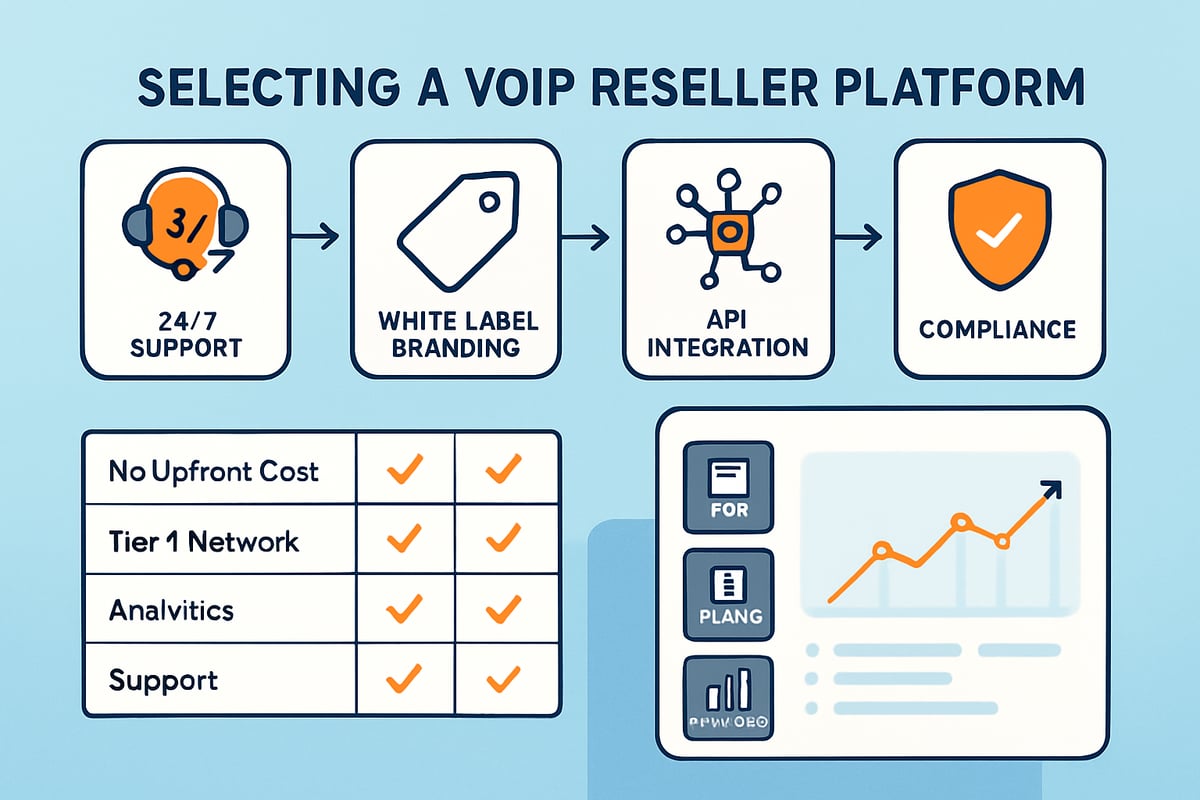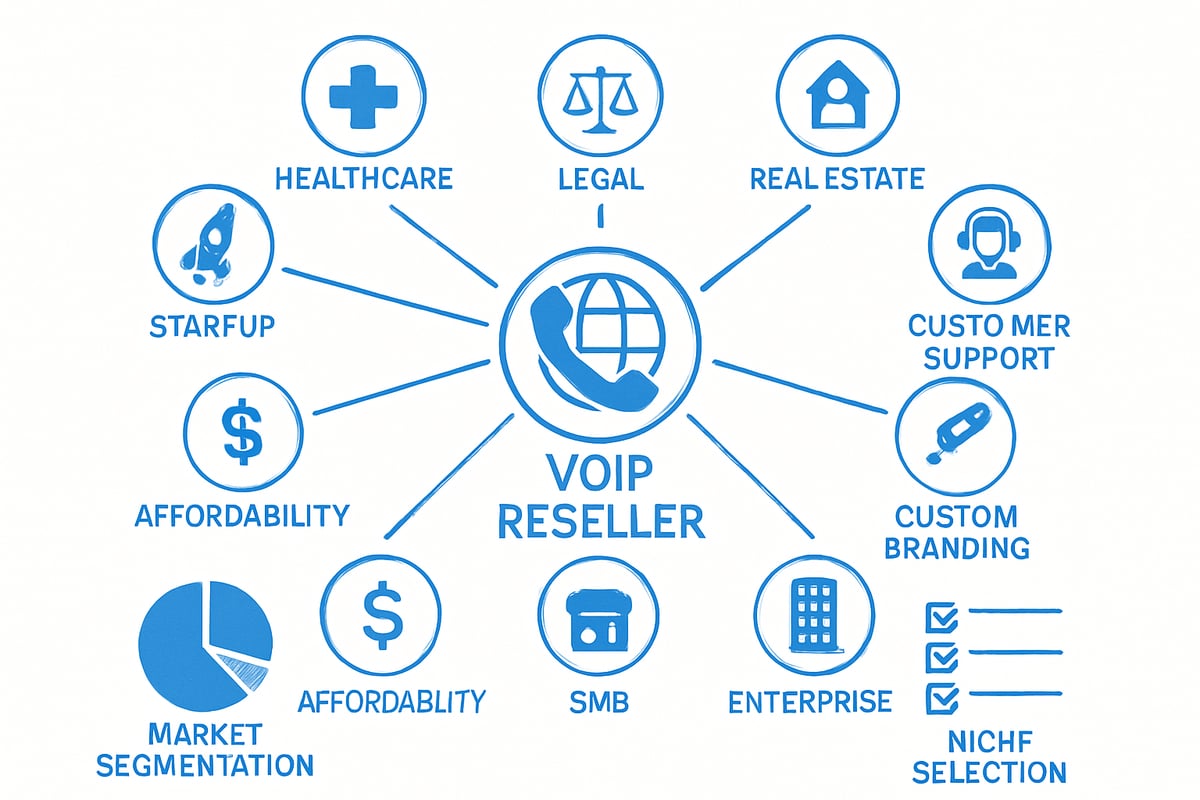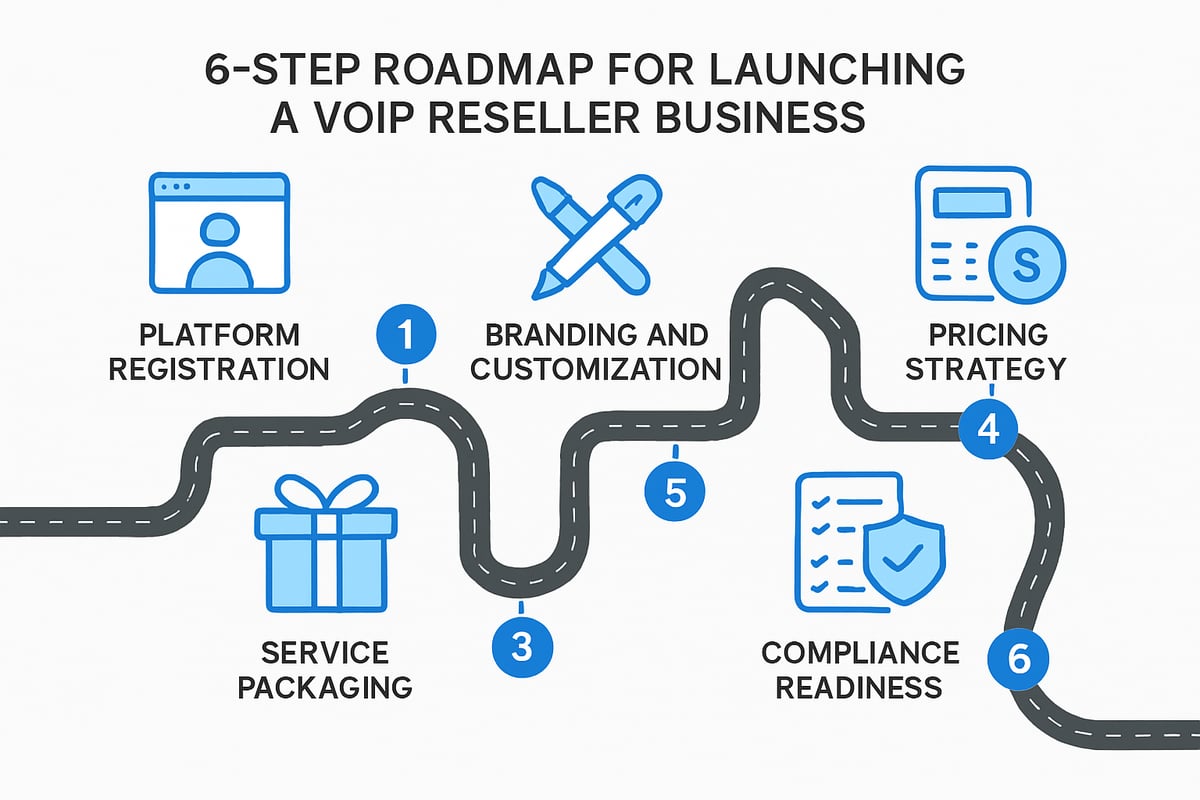VoIP Reseller Guide: Start Your Business in 2025
Launch your VoIP reseller business in 2025 with expert strategies, platform selection tips, and actionable steps for recurring revenue and scalable growth.
Redaction
30/09/2025, 12:30:00Looking to launch a profitable business in the booming communications sector? The voip reseller market is set to explode in 2025, riding a wave of global demand and technological innovation.
By 2032, the VoIP industry is projected to surpass $326 billion, creating massive opportunities for entrepreneurs and IT service providers. Recurring revenue, minimal upfront investment, and scalable business models make this space especially appealing.
In this guide, you will discover insider strategies, actionable steps, and expert insights designed to help you launch and grow a successful business.
Follow along for a step-by-step roadmap that covers everything from choosing a platform to marketing, pricing, customer retention, and answers to your top questions. Your journey to a thriving voip reseller business starts here.
Understanding the 2025 VoIP Reseller Landscape
The voip reseller landscape in 2025 is rapidly evolving, fueled by technological advancements and shifting business communication needs. Entrepreneurs and IT service providers are tapping into this booming sector, attracted by growth prospects and the potential for scalable, recurring revenue. Understanding the market, business models, opportunities, and challenges is crucial for anyone considering a voip reseller venture.

The State of the VoIP Market in 2025
The global VoIP market is set for explosive growth, with projections estimating a market size of $326 billion by 2032. According to VoIP Market Growth Rate 2025, key drivers include the rise of remote work, widespread cloud adoption, and businesses seeking cost-effective, feature-rich communication tools.
Both SMBs and large enterprises are increasing their VoIP investments, demanding flexibility and scalability. White-label solutions and SIP trunking are gaining traction among voip reseller businesses. For example, over 5,000 resellers globally use platforms like VoIP.ms, showing robust market engagement.
What is a VoIP Reseller?
A voip reseller is a business that sells VoIP services under its own brand, utilizing a provider’s infrastructure for delivery. There are two main models: white-label, where the reseller controls branding and customer experience, and standard, which offers less customization.
Key responsibilities for a voip reseller include branding, acquiring customers, providing first-line support, and managing billing, though the extent depends on the chosen platform. Many resellers rely on platforms such as VoIP.ms or SIPTRUNK to streamline customer management and service delivery, making entry into the market more accessible.
Key Benefits and Opportunities
Becoming a voip reseller opens the door to recurring revenue through subscription and usage-based pricing models. Startup costs are minimal, as many platforms offer pay-as-you-go or contract-free options. Resellers gain access to 70+ advanced VoIP features, from call recording to IVR and messaging, which can be tailored to different client needs.
Customizable branding enables resellers to stand out in a crowded market. For instance, VoIP.ms provides a customizable customer portal and REST API, letting resellers create unique offerings that appeal to their target customers and build long-term relationships.
Challenges and Considerations
Despite the opportunities, voip reseller businesses must navigate several challenges. Regulatory compliance, such as CPNI rules, is essential to avoid legal pitfalls. Ensuring high service reliability and call quality is critical for customer satisfaction.
Managing customer support and technical issues can become complex as your client base grows. Standing out in a competitive market requires niche targeting and a clear value proposition. Balancing pricing for profitability while remaining competitive is another key consideration for long-term success.
Step 1: Choosing the Right VoIP Reseller Platform
Selecting the right voip reseller platform is the foundation for your business success. With so many options on the market, making an informed choice will impact your profitability, flexibility, and long-term growth. Let's break down the critical factors you need to evaluate before committing to any provider.

What to Look for in a VoIP Reseller Platform
When choosing a voip reseller platform, prioritize options with no upfront costs or long-term contracts. This approach keeps your risk low and enables you to scale as your business grows. Look for automated provisioning tools that allow you to onboard customers quickly and manage accounts with ease.
Comprehensive support is a must. Ensure the platform offers 24/7 technical assistance and onboarding resources. White-label or brandable customer portals help you manage client relationships while presenting your own branding.
Compatibility is crucial. The best voip reseller platforms integrate seamlessly with major PBX systems and offer robust API access for advanced customization. For a detailed breakdown of industry-leading solutions, check out the Best VoIP service providers to compare your top choices.
Essential Platform Features and Tools
A successful voip reseller business relies on high-quality infrastructure. Choose providers with Tier-1 network backbones for consistent call quality and uptime. Automated billing and tax management capabilities simplify your operations and reduce administrative overhead.
Real-time analytics dashboards give you actionable insights into customer usage and revenue trends. Integration with value-added services, such as SMS, fax, and advanced call features, can help you differentiate your offerings.
Here’s a quick comparison of essential features:
| Feature | Importance | Example |
|---|---|---|
| Tier-1 Network | High | VoIP.ms |
| Real-Time Analytics | Essential | SIPTRUNK |
| White-Label Portal | Must-Have | VoIP.ms |
| API Integration | Advanced | VoIP.ms |
| SMS/Fax Support | Value-Add | SIPTRUNK |
Choose a voip reseller platform that delivers on these essentials for a strong start.
Evaluating Provider Support and Resources
Strong support resources are vital for any voip reseller. Look for platforms that offer onboarding guides, video tutorials, and active community forums to help you learn and troubleshoot quickly.
Dedicated account managers or sales support can make a significant difference, especially when scaling your business or addressing unique client needs. Access to case studies, blogs, and FAQs streamlines your onboarding process and keeps you informed about new features.
A knowledgeable voip reseller is better equipped to deliver excellent customer experiences. Providers like VoIP.ms are known for their extensive YouTube tutorials and detailed Wiki, which can accelerate your learning curve and empower your support team.
Compliance, Security, and Reliability
Regulatory compliance is non-negotiable for every voip reseller. Ensure your provider adheres to CPNI standards and data privacy regulations. A provider's reputation for uptime and network redundancy speaks volumes about their reliability.
Security features such as fraud prevention tools and encrypted communications are critical. Prioritize platforms that regularly update their infrastructure and maintain transparent compliance documentation.
A reliable voip reseller platform not only protects your business but also builds trust with your customers, setting the stage for long-term growth.
Certifications and Expertise
While certifications are not always mandatory, they can add significant value to your voip reseller business. Credentials like Certified VoIP Analyst (CVA) or Certified Telecommunications Network Specialist (CTNS) enhance your credibility and may unlock additional partnership benefits.
Many platforms offer vendor-specific certifications and training resources. Investing in ongoing education helps you stay ahead of industry trends and deliver superior service.
For example, SIPTRUNK encourages partners to pursue TCO credentials, which can differentiate your business and boost customer confidence. Building expertise positions your voip reseller business as a trusted advisor in a competitive market.
Step 2: Defining Your Niche and Target Market
Choosing the right niche is essential for every aspiring voip reseller. The communications market is vast, and specialization can make your business stand out. By carefully defining your target audience, you set the stage for sustainable growth and long-term success.

Identifying High-Value Customer Segments
A successful voip reseller targets industries with heavy communication needs. Sectors like healthcare, legal, real estate, and customer support rely on seamless voice and messaging solutions. Consider business size too - startups may prioritize cost, while mid-sized firms want advanced features.
- Healthcare: Secure, HIPAA-compliant communications
- Legal: Reliable call recording and archiving
- Real Estate: Mobility and integrations
- Customer Support: IVR, analytics, and call routing
If you are focusing on clients seeking affordable solutions, review the insights in Affordable VoIP solutions to refine your approach. This can help you match your offerings to the right audience and maximize profitability as a voip reseller.
Analyzing Customer Needs and Pain Points
Every voip reseller must understand what keeps clients up at night. Common concerns include call quality, security, reliability, and cost. Businesses moving from legacy systems may hesitate due to fears of lost connections or data breaches.
Addressing these pain points builds trust. For example, highlight how your voip reseller services ensure secure, encrypted calls and seamless migration support. By offering tailored onboarding and technical guidance, you help clients overcome resistance and see the value in switching.
Leveraging Data and Market Research
Market research is a vital tool for every voip reseller. Use website analytics and social media insights to identify trends in demand. Analyze competitor offerings to spot gaps and opportunities.
- Review search terms and website traffic patterns
- Monitor engagement on LinkedIn and industry forums
- Study top competitors' packages and pricing
Local SEO and targeted networking can also reinforce your regional presence. When you use data to inform your strategy, you position your voip reseller business for smarter growth.
Crafting Your Unique Value Proposition
What sets your voip reseller brand apart? Define your unique selling points by emphasizing flexibility, white-label branding, and custom solutions for specific industries. Highlight advanced features, such as call recording, IVR, or messaging integrations.
Develop custom plans or pricing tiers tailored to your chosen niche. For example, offer healthcare clients HIPAA-compliant communications or provide real estate firms with mobile-first features. A clear value proposition helps your voip reseller business stand out in a competitive field.
Building Partnerships and Networks
Collaboration is crucial for expanding your voip reseller reach. Attend local business events, Chamber of Commerce meetings, and industry conferences to build relationships. Partner with managed service providers, ISPs, and IT consultants for mutually beneficial referrals.
- Attend local business expos
- Build alliances with IT consultants
- Join online industry groups
By nurturing your network, you gain access to new leads and industry insights. Strategic partnerships help your voip reseller business grow faster and more sustainably.
Step 3: Setting Up and Launching Your VoIP Reseller Business
Launching your voip reseller business in 2025 requires a strategic, step-by-step approach. With the right plan, you can move from initial setup to a fully operational, scalable business. Let’s break down the essential phases, ensuring you follow a proven roadmap for success.

Registering and Integrating with Your Chosen Platform
The first step for any voip reseller is registering with a trusted platform. Begin by signing up for a reseller account and providing your business information. Upload your logo and set your brand preferences to ensure a professional presence from the start.
Once your account is active, configure your customer portal. Most leading platforms, such as VoIP.ms, offer guided onboarding and make it possible to start offering services within minutes. Set up your initial packages and test the system to verify everything works as expected.
A successful voip reseller invests time in learning the platform’s dashboard and tools. This early preparation streamlines future customer management and support.
Branding, White-Labeling, and Customization
Brand identity is crucial for standing out as a voip reseller. Choose a white-label solution that lets you fully customize the customer interface, invoices, and notifications. Add your logo, company colors, and tailored messaging to create a seamless, trustworthy experience.
White-labeling empowers you to build customer loyalty and present your business as a tech leader, not just a service broker. Most platforms offer templates or drag-and-drop editors for easy customization.
Remember, a voip reseller’s brand is more than visuals. Ensure your support channels, onboarding materials, and communications reflect your company’s unique voice and standards.
Product and Service Packaging
A competitive voip reseller business thrives on diverse, well-structured service packages. Develop tiered plans - such as basic, pro, and enterprise - to cater to various customer needs. Include popular features like call recording, business SMS, IVR, and fax-to-email.
Consider bundling value-added services for greater appeal. For guidance on service differentiation, review this Comparing VoIP options article to help you choose what to offer your clients.
Use the platform’s tools to create and manage these packages efficiently. Regularly review your offerings to ensure they remain competitive as the market evolves.
Pricing Strategies for 2025
Selecting the right pricing model is key for a voip reseller aiming for profitability. Choose between subscription-based, usage-based, or a hybrid approach. Subscription models provide predictable revenue, while usage-based pricing appeals to clients with fluctuating needs.
Block pricing and unlimited plans are popular in 2025, giving customers flexibility and cost control. As a voip reseller, monitor competitor rates and analyze customer feedback to refine your pricing.
Leverage your platform’s analytics to track margins and adjust packages as needed. This adaptability keeps your business both competitive and profitable.
Integrating with Your Existing Business or Launching New
Decide whether your voip reseller services will complement your current business or operate as a standalone brand. Many IT firms and MSPs add VoIP to their portfolios, integrating with existing websites and CRM systems for unified management.
Alternatively, launching a new brand allows targeted marketing and positioning in a specific niche. Whichever route you choose, ensure your voip reseller platform offers API integration and flexible management tools.
Evaluate your current customer base to identify cross-selling opportunities. A well-integrated voip reseller offering enhances your business’s overall value.
Ensuring Compliance and Legal Readiness
Every voip reseller must prioritize compliance with telecom regulations. Understand and implement CPNI protocols, and research any local or regional requirements. Prepare clear terms of service, privacy policies, and acceptable use policies to protect your business and customers.
Regulatory adherence is not optional for a voip reseller. Platforms often provide compliance resources, but it is your responsibility to stay updated on legal changes. Maintain accurate records, and ensure your operations meet industry standards for data privacy and security.
Taking these legal steps builds trust and safeguards your voip reseller business for the long term.
Step 4: Marketing and Growing Your VoIP Reseller Business
Launching your voip reseller business is only the beginning. To thrive in a rapidly expanding market, you need a focused, multi-channel marketing approach. Effective growth strategies will help you attract, convert, and retain high-value clients in 2025. Let’s break down the essential steps for building momentum and scaling your voip reseller brand.
Building an Effective Marketing Strategy
A robust marketing strategy is the backbone of your voip reseller business. Start by identifying your target client profile and tailoring your messaging to their pain points. Combine SEO and SEM to capture both organic and paid leads. Focus on keywords like "cloud PBX," "business VoIP," and your local area for better reach.
Investing in marketing is crucial because the global VoIP market is forecasted to see significant growth, as highlighted in the Global VoIP Market Forecast 2025-2033. This surge means more businesses are searching for modern communication solutions, so your brand visibility matters.
Consider these marketing tactics:
- Optimize your website for local and industry-specific searches.
- Run targeted pay-per-click campaigns for quick lead generation.
- Use retargeting ads to re-engage interested visitors.
A clear, data-driven marketing plan positions your voip reseller business for sustainable growth.
Content Marketing and Thought Leadership
Establishing authority is essential in the competitive voip reseller landscape. Create educational blog posts, detailed guides, and case studies that address your audience’s common questions. Share actionable tips on VoIP adoption, cost savings, and troubleshooting.
Leverage video content, such as YouTube tutorials and webinars, to demonstrate your expertise. This builds trust and helps potential clients see you as a go-to resource.
Consider offering downloadable resources like checklists or whitepapers. These assets can capture leads and provide ongoing value, nurturing prospects through the decision process.
Consistent, high-quality content marketing helps your voip reseller brand stand out as a trusted advisor, not just another service provider.
Leveraging Social Media and Email Campaigns
Social media and email marketing are key tools for expanding your voip reseller reach. Use LinkedIn to connect with business owners, IT managers, and industry influencers. Share success stories, product updates, and behind-the-scenes content to humanize your brand.
Set up automated email campaigns to nurture leads. Drip sequences can introduce your services, share educational content, and prompt prospects to schedule a demo. Personalize your messaging based on recipient interests for higher engagement.
Consider these tactics:
- Join industry groups and participate in discussions.
- Use polls and surveys to gather feedback and spark interaction.
- Highlight customer testimonials and reviews.
A strategic mix of social and email marketing keeps your voip reseller business top of mind for potential clients.
Local Networking and Strategic Partnerships
Building local connections accelerates growth for a voip reseller business. Attend Chamber of Commerce meetings, business expos, and industry meetups to network with potential clients and partners. Face-to-face interactions foster trust and open doors to new opportunities.
Form partnerships with managed service providers, IT consultants, and ISPs. These alliances can lead to valuable referrals and joint marketing initiatives. Local SEO optimization further increases your visibility within your region.
Key networking actions:
- Sponsor local events or workshops on VoIP technology.
- Collaborate with other service providers for bundled offers.
- Collect and showcase local business testimonials.
By embedding your voip reseller brand in the community, you create a reliable pipeline of local leads.
Tracking, Analytics, and Continuous Improvement
Successful voip reseller businesses rely on data to refine their marketing strategies. Implement analytics tools to track website traffic, ad performance, and lead conversions. Review key metrics regularly to identify what’s working and where adjustments are needed.
Use real-time dashboards to monitor the effectiveness of your campaigns. Set clear KPIs, such as cost per lead, conversion rates, and customer acquisition costs.
Best practices:
- A/B test landing pages and ad copy for better results.
- Analyze churn and retention data to improve customer loyalty.
- Adjust marketing spend to focus on high-performing channels.
With a culture of continuous improvement, your voip reseller business can adapt quickly and scale efficiently.
Step 5: Delivering Exceptional Support and Retaining Clients
Exceptional support is the backbone of a successful voip reseller business. The right approach to onboarding, technical help, ongoing engagement, and smart automation can transform new customers into loyal brand advocates.
Onboarding and Customer Education
A streamlined onboarding process sets the tone for your voip reseller brand. Provide step-by-step setup guides, concise video tutorials, and a well-organized FAQ section. Personalized onboarding sessions help new customers understand features and get started confidently.
For clients new to VoIP PBX systems, share resources such as the VoIP PBX system guide to demystify advanced setups. This not only builds trust but also reduces the risk of early churn.
- Offer welcome emails with key resources.
- Schedule live walk-throughs for high-value clients.
- Direct users to a knowledge base for self-service learning.
A well-educated customer is more likely to maximize value and remain loyal to your voip reseller service.
Ongoing Technical Support and Troubleshooting
Reliable technical support is a non-negotiable for any voip reseller. Ensure you provide round-the-clock or rapid-response support channels, including tickets, live chat, and phone assistance. Quick issue resolution minimizes downtime and maintains client confidence.
Consider implementing a tiered support structure:
- Level 1: Basic setup and usage queries.
- Level 2: Advanced configuration and troubleshooting.
- Level 3: Escalations to platform provider.
Document common solutions in your knowledge base to empower both staff and customers. Regularly review support analytics to identify trends and preempt recurring problems.
Proactive Customer Engagement and Relationship Building
Staying connected with your clients is critical for any voip reseller. Schedule regular check-ins, send satisfaction surveys, and invite feedback on new features. These touchpoints uncover upsell opportunities and demonstrate that your business values customer success.
- Use personalized email campaigns to highlight new services.
- Offer webinars or Q&A sessions for advanced topics.
- Reward referrals or long-term loyalty with special incentives.
Consistent engagement strengthens relationships and positions your voip reseller brand as a trusted partner.
Managing Churn and Maximizing Retention
Minimizing churn is vital for sustainable growth as a voip reseller. Address service issues promptly and transparently. Offer flexible plans that accommodate changing business needs, and use data to identify at-risk accounts.
Analyze churn data:
- Track reasons for cancellations.
- Monitor usage patterns for warning signs.
- Implement win-back campaigns for departing clients.
Providing feature-rich offerings and responsive support increases satisfaction and retention rates for your voip reseller business.
Scaling Support with Automation and Self-Service
As your voip reseller business grows, automation becomes essential. Deploy self-service portals where customers can manage accounts, view usage, and access troubleshooting tools. Chatbots and AI-powered FAQs handle routine questions, freeing your team for complex issues.
- Enable automated provisioning for instant service changes.
- Use analytics dashboards to monitor support metrics.
- Update self-service content regularly for accuracy.
Efficient automation reduces operational costs and ensures consistent, high-quality support for every voip reseller client.
Frequently Asked Questions About Starting a VoIP Reseller Business
Curious about launching your own voip reseller venture? Below, we address the most common questions entrepreneurs have when entering the growing voip reseller market.
What certifications do I need to become a voip reseller?
While no certifications are legally required, credentials can boost your credibility. Consider industry certifications like Certified VoIP Analyst (CVA) and Certified Telecommunications Network Specialist (CTNS). Some vendors also offer their own training programs.
| Certification | Description |
|---|---|
| CVA | VoIP fundamentals, best practices |
| CTNS | Telecom network essentials |
| Vendor-Specific | Platform-based skills and support |
How much can I earn as a voip reseller?
Earnings depend on your pricing, target market, and customer base. Many resellers report profit margins of 25-50 percent, with recurring revenue from subscriptions and call usage. Control over pricing lets you maximize profitability as you scale.
Do I need technical expertise to start?
You do not need advanced technical skills. Most platforms manage the infrastructure for you. Basic understanding of VoIP services, customer support, and billing is helpful for a smooth start.
What’s the difference between VoIP reselling and SIP trunking platforms?
A voip reseller typically offers full-featured phone systems under their own brand, while SIP trunking focuses on connecting existing phone systems to the internet. Both models can be profitable, but reselling offers more branding and feature flexibility.
How do I ensure compliance with telecom regulations?
Compliance is crucial. Understand CPNI (Customer Proprietary Network Information) rules, local telecom laws, and privacy requirements. Choose providers with built-in compliance features and consult legal resources as needed.
What are the best ways to attract my first clients?
Focus on niche marketing, local SEO, and leveraging industry partnerships. Content marketing, LinkedIn outreach, and educational webinars help build trust. For competitive insights, explore the Top 20 VoIP Software Companies 2025-2035 to understand market leaders.
How do I handle billing and taxes as a reseller?
Many platforms offer automated billing, tax calculation, and payment processing. Set up clear terms, review tax obligations in your region, and consider using accounting software to streamline finances.
What features should I prioritize when choosing a platform?
Look for these essentials:
- White-label branding options
- 24/7 support
- Automated provisioning
- Real-time analytics
- Integration with SMS, fax, and CRM tools
Are there real-world examples and data for voip resellers?
Yes. Over 5,000 resellers worldwide use leading platforms, reflecting strong demand and opportunity. The global market is projected to exceed $326 billion by 2032, making it an ideal time to become a voip reseller.As you’ve seen throughout this guide, the VoIP reseller market in 2025 offers tremendous potential - recurring revenue, low barriers to entry, and a global customer base seeking reliable, enterprise-grade solutions. Whether you’re an entrepreneur or a developer, you have the tools and strategies to build a thriving business with VoIPStore’s robust platform, real-time analytics, and dedicated support. Ready to take the first step and turn your ambitions into reality? Let’s put all this insight into action and launch your VoIP reseller journey today - your future clients are waiting. Start now!